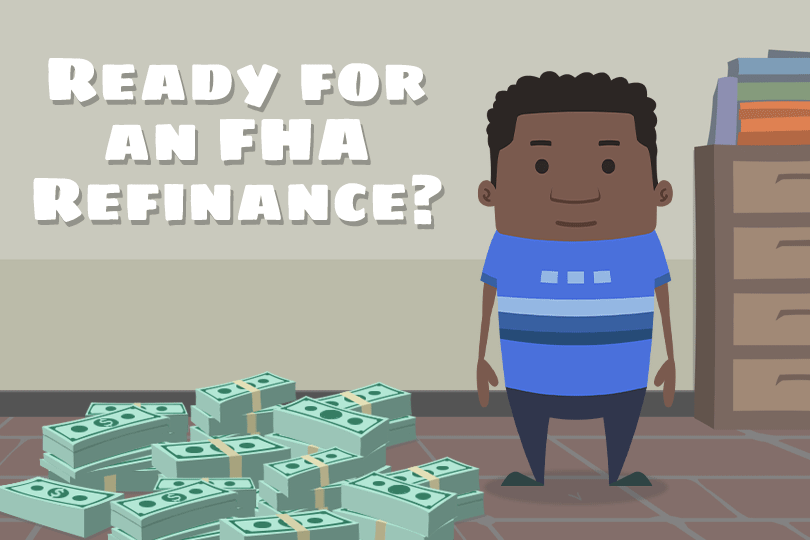When not to Consider Refinancing a Home
March 13, 2024
But there are other smart reasons not to refinance a home or to delay the decision until later. We examine some of the major ones below.
FHA Refinance Loans for Long-Term Homeowners
If you plan to refinance your home loan, you’ll need to save for the closing costs, origination fee, etc. One lender estimates the price of a refinance loan to be between 3% and 6% of the loan amount.
But does paying that fee make sense if you don’t plan to stay in the home for a long time? If you’re considering selling the property in the short term or even a bit longer down the road, you may do well to save the expense of a refinance loan in anticipation of not owning the home any longer.
If you plan to keep the house long-term, the math is different. How much do you save on a monthly mortgage payment by refinancing? Refinancing may make more sense if you aim to lower your monthly bills.
However, refinancing to save money throughout the loan in interest doesn’t work if you don’t stay in the house long term.
Refinance to Renovate?
If you need cash to improve a property, there are multiple FHA options to refinance. The numbers drive a decision to go with an FHA cash-out refinance or an FHA 203(k) rehab loan.
If you want to make standard improvements that don’t require work on load-bearing walls, you can use a smaller 203(k) rehab loan rather than fully refinancing your home with a cash-out loan to do so.
If you need to do extensive work covered under the 203(k) program, applying for a standard 203(k) refinance loan may be wise.
Why? Because an FHA cash-out refinance is limited to 80% of the home's value. A 203(k) rehab refinance loan offers an LTV of “110 percent of the After Improved Value (100 percent for condominiums)” or the appropriate area loan limit according to HUD 4000.1, the FHA Single-Family Lender’s Handbook.
Don’t Refinance to Cover Credit Card Debt
Why give this advice specifically to those who want to apply for an FHA cash-out refinance loan to pay off credit card bills? Because using credit to pay off revolving credit can lead to the borrower running up the same accounts again later, canceling out the first credit card payoff.
It’s better to pay off debt that won’t recur if you do so with an FHA cash-out refi.
------------------------------
RELATED VIDEOS:
Don't Skip the Home Inspection
Bigger is Better With a Jumbo Loan
Insuring Mortgages With the FHA Funding Fee

FHA Loan Articles
December 10, 2024The FHA announced increased loan limits for 2025, providing those seeking FHA-insured mortgages after January 1st with increased purchasing power. In this article, we explore the key aspects of these limits and their implications for your homeownership goals.
When you are approved for an FHA-insured loan, the FHA guarantees a portion of the loan to the lender, lowering lender risk...
December 9, 2024The Federal Housing Administration (FHA) helps people buy homes, especially those buying for the first time or who might not have perfect credit. In 2025, there is good news for FHA borrowers. FHA home loan limits are going up.
In most places, the FHA loan limit for a single-family home in 2025 is $524,225. This is more than it was in 2024. However, in expensive areas, where houses cost more, the limit can be as high as $1,209,750.
December 5, 2024The Federal Housing Administration (FHA) has some ground rules regarding cash-out refinances. These rules are designed to protect both you and the lender, ensuring you have enough ownership of your home and reducing the risk of foreclosure. How long must you own your home before you can apply for FHA cash-out refinancing?
December 4, 2024When you think about owning a farm, do you dream of vast landscapes and thriving agricultural enterprises? Or are you looking for a quaint farm-style house to live in but not necessarily to start a new farming career?
Borrowers who want to buy a farm residence are in luck with the FHA loan program, which includes options to purchase farm residences.
November 27, 2024If you are new to the home loan process, you may wonder how your loan officer will interpret your application data. How lenient is the lender with issues related to debt, credit utilization, and related factors? We examine some key points, but remember that what follows is not financial advice. Always consult a finance or tax professional for the most current information.







